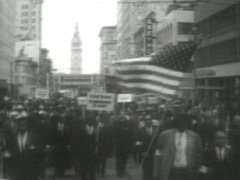|
||||||
|
|
||||||
|
|
|
||||||||
| At the time of the formation of the Black Panther party, civil rights for Black Americans was a corner that had just been turned. The Civil Rights Act of 1964 essentially ended segregation in the US. A mass movement starting in the 1950's, through nonviolent protest had broken the pattern of racially segregated public facilities in the South. It was through 3 key incidents that the Civil Rights Act had been achieved. |  |
|||||||
| The first was Brown vs. Board of Education of Topeka, Kansas on May 17, 1954 in which the Supreme Court declared separate educational facilities unconstitutional; this ruling created a mass groundswell for rights for all. The next case involved Rosa Parks on December 1, 1955 - she was arrested for not moving to the "Negro" section of the public bus in her town of Montgomery, Alabama. A one-day boycott of the bus system was what Martin Luther King Jr. needed; he took up the cause and turned the disorganized protestors into an organized group - the SCLC [Southern Christian Leadership Conference]. Over the next 5 years, the SCLC accomplished much through protest & boycotts but desegregation had not been achieved across the US. | ||||||||
 |
||||||||
| The next major actions were the sit-ins of the early 1960's, led mainly by the SNCC [Student Non-violent Coordinating Committee]. The sit-ins started with Black students trying to get served at a whites only lunch counter, and spread across the nation to department stores, libraries and movie theatres to name a few. The movement reached its climax in 1963 with the Washington March that helped force the Civil Rights bill through Congress. One year later, the Voting Rights Act was passed which guaranteed voting rights to Black voters.
In December 1965, Malcolm X was assassinated and a large group of young Blacks felt disenfranchised. In 1966, a new militancy fomented within the young Black population to achieve greater power, leading to the formation of such groups as the Black Panthers at the end of '66. It was the assassination of Martin Luther King Jr. that steeled the resolve of Black Americans to continue the struggle for equal rights. |
||||||||
|
||||||||
| Copyright 2002 Luna Ray Films, LLC. All Rights Reserved | Design by Fresh Karma | ||||||||
